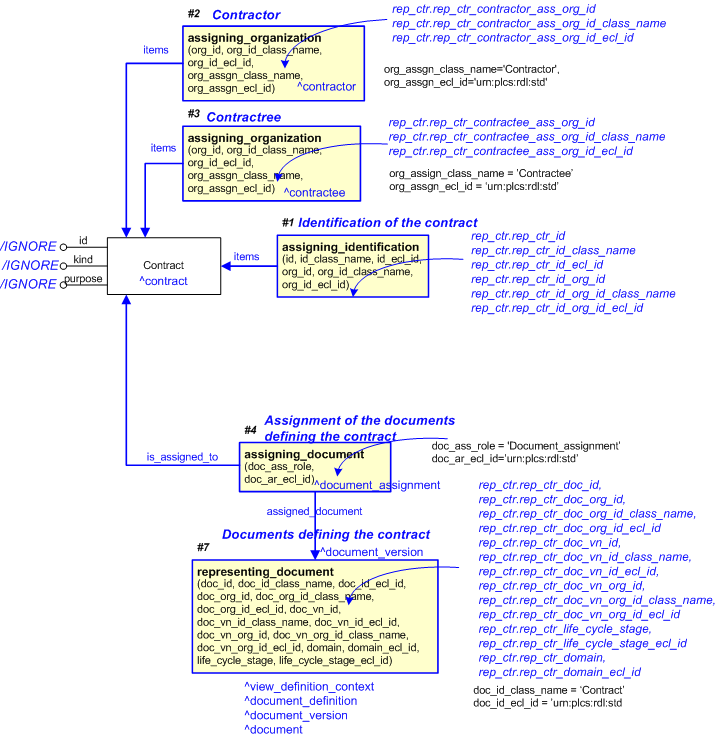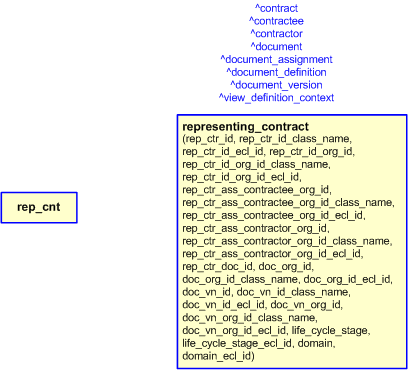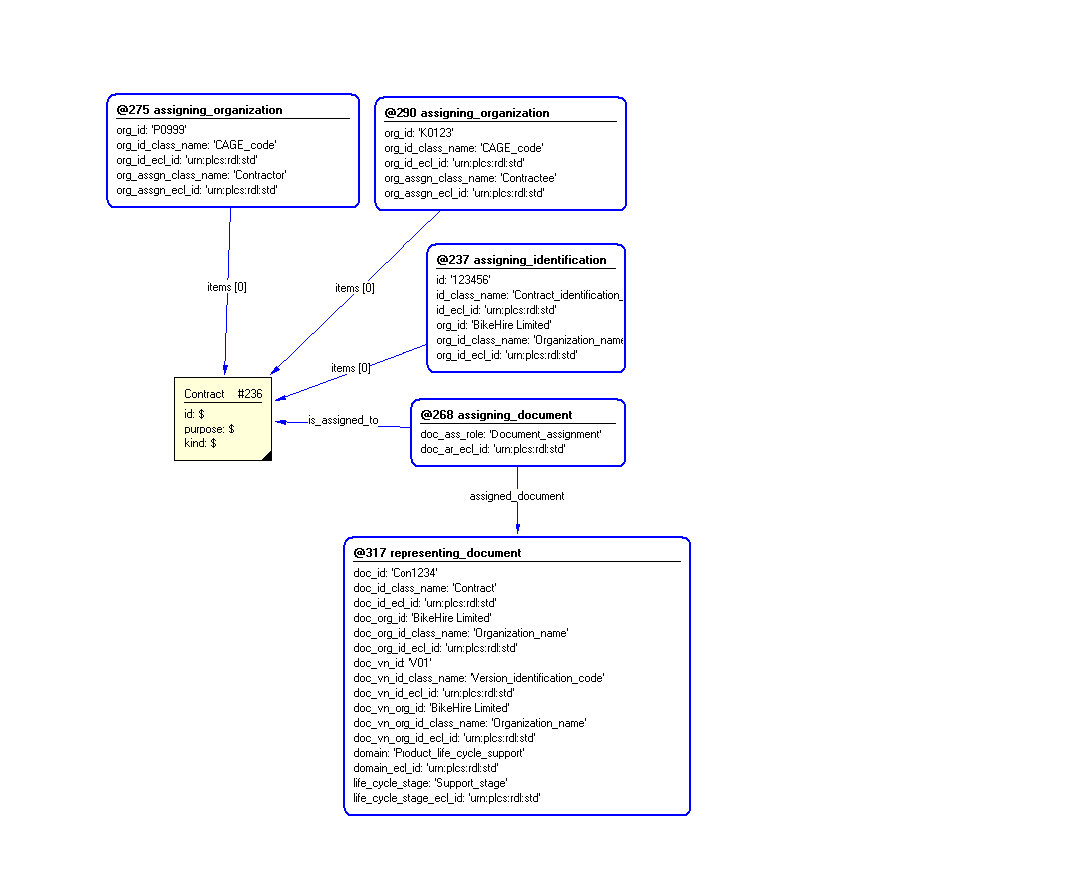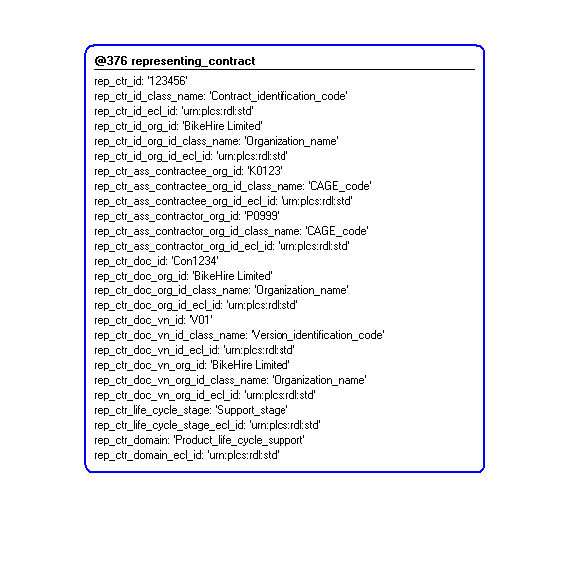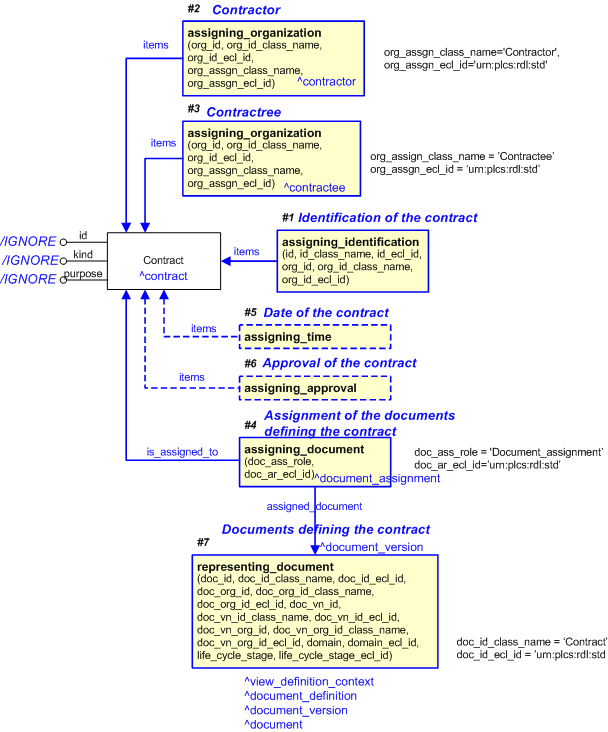| Template:— representing_contract (rep_ctr) |
Date: 2008/03/03 07:36:04
Revision: 1.21
|
This section specifies the template representing_contract.
NOTE
An explanation of a template and the associated instantiation path is
provided in the
Template overview
section.
This template describes the representation and identification of a contract and
the relationship between a contract and the parties and documents involved, and the products
created and/or actions undertaken as a result of the contract.
The EXPRESS-G diagram in
Figure
1
shows the templates and EXPRESS entities that are required
to represent the template
"representing_contract".
The text highlighted in blue shows the template parameters.
Figure 1 — An EXPRESS-G representation of the Information model for representing_contract
The graphic for the template to be used in other EXPRESS-G diagrams
is shown in Figure
2
below.
Figure 2 — The graphical representation of the representing_contract template
The following input parameters are defined for this template:
The name or identifier of the contract.
The following classes and their sub-classes can be used:
The identifier of the
External_class_library storing the
definition of the class referenced by the parameter @rep_ctr_id_class_name class.
The name or identifier of the organization responsible for identifying the
contract.
The following classes and their sub-classes can be used:
The identifier of the
External_class_library storing the
definition of the class referenced by the parameter @rep_ctr_org_id_class_name class.
The name or identifier of the contractee.
The following classes and their sub-classes can be used:
The identifier of the
External_class_library storing the
definition of the class referenced by the parameter @rep_ctr_ass_org_id_class_name
class.
The name or identifier of the contractor.
The following classes and their sub-classes can be used:
The identifier of the
External_class_library storing the
definition of the class referenced by the parameter @rep_ctr_ass_org_id_class_name
class.
The name or identifier of the document containing the contract definition.
The name or identifier of the organization responsible for the contract document representation
The name of the class being used to classify the identification (
Identification_assignment)
of the organization responsible for creating the contract document representation
The following classes and their sub-classes can be used:
The identifier of the
External_class_library storing the
definition of the class used to classify the organization identifier.
The version identifier of the contract document version
The following classes and their sub-classes can be used:
The location of the
External_class_library
that stores the classifications used to classify the contract document, contract document_version and contract
document_definition
The name or identifier of the organization responsible for the contract document representation
The name of the class being used to classify the identification (
Identification_assignment)
of the organization responsible for the contract document representation
The following classes and their sub-classes can be used:
The identifier of the
External_class_library storing the
definition of the class used to classify the organization identifier.
The id of the
External_class_library
used to describe the type of life cycle stage of the view_definition_context instance.
The following classes and their sub-classes can be used:
The identifier of the
External_class_library storing the
definition of the class used to classify the organization identifier.
rep_ctr_domain (Default=Product_life_cycle_support,Type='CLASS', Optional)
The id of the
External_class_library
used to describe the type of application domain of the view_definition_context instance.
The following classes and their sub-classes can be used:
The identifier of the
External_class_library storing the
definition of the class used to classify the organization identifier.
The following reference parameters are defined for this template:
Allow the
Contract
entity instantiated in this path to be referenced when this template is used.
Note: The
Contract
entity can be referenced in a template path by:
%^target = $representing_contract.contract%
where
target
is the parameter to which the
Contract
is bound.
Allow the
Organization
entity instantiated in this path to be referenced when this template is used.
Note: The
Organization
entity can be referenced in a template path by:
%^target = $representing_contract.contractor%
where
target
is the parameter to which the
Organization
is bound.
Allow the
Organization
entity instantiated in this path to be referenced when this template is used.
Note: The
Organization
entity can be referenced in a template path by:
%^target = $representing_contract.contractee%
where
target
is the parameter to which the
Organization
is bound.
%^target = $representing_contract.view_definition_context%
Allow the
Document_definition
entity instantiated in this path to be referenced when this template is used.
%^target = $representing_contract.document_definition%
Allow the
Document_version
entity instantiated in this path to be referenced when this template is used.
%^target = $representing_contract.document_version%
Allow the
Document
entity instantiated in this path to be referenced when this template is used.
Note: The
Document
entity can be referenced in a template path by:
%^target = $representing_contract.document%
where
target
is the parameter to which the
Document
is bound.
Allow the
Document_assignment
entity instantiated in this path to be referenced when this template is used.
%^target = $representing_contract.document_assignment%
The following parameter combinations specify a uniqueness constraint:
Unique constraint: Unique Contract
The instantiation path shown below specifies the entities that are to be
instantiated by the template.
A description of templates and the syntax for the instantiation path is
provided in the
Templates Help/Information section.
-- Instantiate a Contract Contract-- Bind the Contract to the parameter ^contract -- The parameter is a reference parameter so the Contract_assignment -- entity can be referred to when this template is used. %^contract =
Contract%
-- Set the Contract attributes id, purpose and kind to be ignored Contract.id = '/IGNORE'
Contract.kind = '/IGNORE'
Contract.purpose = '/IGNORE'
-- Identify the Contract /
assigning_identification(
items=^contract,
id=@rep_ctr_id,
id_class_name=@rep_ctr_id_class_name,
id_ecl_id=@rep_ctr_id_ecl_id,
org_id=@rep_ctr_id_org_id,
org_id_class_name=@rep_ctr_id_org_id_class_name,
org_id_ecl_id=@rep_ctr_id_org_id_ecl_id )/
-- documents defining the Contract /
representing_document(
doc_id=@rep_ctr_doc_id,
doc_id_class_name='Contract',
doc_id_ecl_id='urn:plcs:rdl:std',
doc_org_id=@rep_ctr_doc_org_id,
doc_org_id_class_name=@rep_ctr_doc_org_id_class_name,
doc_org_id_ecl_id=@rep_ctr_doc_org_id_ecl_id,
doc_vn_id=@rep_ctr_doc_vn_id,
doc_vn_id_class_name=@rep_ctr_doc_vn_id_class_name,
doc_vn_id_ecl_id=@rep_ctr_doc_vn_id_ecl_id,
doc_vn_org_id=@rep_ctr_doc_vn_org_id,
doc_vn_org_id_class_name=@rep_ctr_doc_vn_org_id_class_name,
doc_vn_org_id_ecl_id=@rep_ctr_doc_vn_org_id_ecl_id,
domain=@rep_ctr_domain,
domain_ecl_id=@rep_ctr_domain_ecl_id,
life_cycle_stage=@rep_ctr_life_cycle_stage,
life_cycle_stage_ecl_id=@rep_ctr_life_cycle_stage_ecl_id)/
%^view_definition_context = $representing_document.view_definition_context%
%^document_definition = $representing_document.document_definition%
%^document_version = $representing_document.document_version%
%^document = $representing_document.document%
-- Assign a document to the Contract /
assigning_document(
doc_ass_role='Document_assignment',
doc_ar_ecl_id='urn:plcs:rdl:std',
is_assigned_to=^contract),
assigned_document=^document_version)/
%^document_assignment = $assigning_document.doc_asg%
-- Assign a contractee to the Contract /
assigning_organization(
items=^contract,
org_id=@rep_ctr_ass_contractee_org_id,
org_id_class_name=@rep_ctr_ass_contractee_org_id_class_name,
org_id_ecl_id=@rep_ctr_ass_contractee_org_id_ecl_id,
org_assgn_class_name='Contractee',
org_assgn_ecl_id='urn:plcs:rdl:std' )/
%^contractee = $assigning_organization.organization%
-- Assign a contractor to the Contract /
assigning_organization(
items=^contract,
org_id=@rep_ctr_ass_contractor_org_id,
org_id_class_name=@rep_ctr_ass_contractor_org_id_class_name,
org_id_ecl_id=@rep_ctr_ass_contractor_org_id_ecl_id,
org_assgn_class_name='Contractor',
org_assgn_ecl_id='urn:plcs:rdl:std' )/
%^contractor = $assigning_organization.organization%
The following entities are instantiated with attributes as specified:
The instance diagram in Figure
3
shows an example of the EXPRESS entities and templates that are instantiated by the template:
/representing_contract(rep_ctr_id='123456', rep_ctr_id_class_name='Contract_identification_code', rep_ctr_id_ecl_id='urn:plcs:rdl:std', rep_ctr_id_org_id='BikeHire Limited', rep_ctr_id_org_id_class_name='Organization_name', rep_ctr_id_org_id_ecl_id='urn:plcs:rdl:std', rep_ctr_ass_contractee_org_id='K0123', rep_ctr_ass_contractee_org_id_class_name='CAGE_code', rep_ctr_ass_contractee_org_id_ecl_id='urn:plcs:rdl:std', rep_ctr_ass_contractor_org_id='P0999', rep_ctr_ass_contractor_org_id_class_name='CAGE_code', rep_ctr_ass_contractor_org_id_ecl_id='urn:plcs:rdl:std', rep_ctr_doc_id='Con1234', rep_ctr_doc_org_id='BikeHire Limited', rep_ctr_doc_org_id_class_name='Organization_name', rep_ctr_doc_org_id_ecl_id='urn:plcs:rdl:std', rep_ctr_doc_vn_id='V01', rep_ctr_doc_vn_id_class_name='Version_identification_code', rep_ctr_doc_vn_id_ecl_id='urn:plcs:rdl:std', rep_ctr_doc_vn_org_id='BikeHire Limited', rep_ctr_doc_vn_org_id_class_name='Organization_name', rep_ctr_doc_vn_org_id_ecl_id='urn:plcs:rdl:std', rep_ctr_life_cycle_stage='Support_stage', rep_ctr_life_cycle_stage_ecl_id='urn:plcs:rdl:std', rep_ctr_domain='Product_life_cycle_support', rep_ctr_domain_ecl_id='urn:plcs:rdl:std')/
(an illustration of the consolidated representing_contract template is shown in
Figure
4 below.)
Figure 3 — Entities instantiated by representing_contract template
The instance diagram in
Figure
4
shows the graphic symbol for the template that is to be
used in other instance diagrams. The example template is:
/representing_contract(rep_ctr_id='123456', rep_ctr_id_class_name='Contract_identification_code', rep_ctr_id_ecl_id='urn:plcs:rdl:std', rep_ctr_id_org_id='BikeHire Limited', rep_ctr_id_org_id_class_name='Organization_name', rep_ctr_id_org_id_ecl_id='urn:plcs:rdl:std', rep_ctr_ass_contractee_org_id='K0123', rep_ctr_ass_contractee_org_id_class_name='CAGE_code', rep_ctr_ass_contractee_org_id_ecl_id='urn:plcs:rdl:std', rep_ctr_ass_contractor_org_id='P0999', rep_ctr_ass_contractor_org_id_class_name='CAGE_code', rep_ctr_ass_contractor_org_id_ecl_id='urn:plcs:rdl:std', rep_ctr_doc_id='Con1234', rep_ctr_doc_org_id='BikeHire Limited', rep_ctr_doc_org_id_class_name='Organization_name', rep_ctr_doc_org_id_ecl_id='urn:plcs:rdl:std', rep_ctr_doc_vn_id='V01', rep_ctr_doc_vn_id_class_name='Version_identification_code', rep_ctr_doc_vn_id_ecl_id='urn:plcs:rdl:std', rep_ctr_doc_vn_org_id='BikeHire Limited', rep_ctr_doc_vn_org_id_class_name='Organization_name', rep_ctr_doc_vn_org_id_ecl_id='urn:plcs:rdl:std', rep_ctr_life_cycle_stage='Support_stage', rep_ctr_life_cycle_stage_ecl_id='urn:plcs:rdl:std', rep_ctr_domain='Product_life_cycle_support', rep_ctr_domain_ecl_id='urn:plcs:rdl:std')/
Figure 4 — Instantiation of assigning_contract template
The following section details how the
representing_contract
template can be optionally characterized by assigning
other constructs to it. These are characterizations commonly
applied to the template. The ISO 10303-239 EXPRESS model may enable
other assignments to the entities instantiated by the template.
The EXPRESS-G diagram in Figure
5
shows the possible characterizations of the template
"representing_contract".
Figure 5 — Characterization of representing_contract template
The following characterizations may apply:
Characterization Assigning time
NOTE this characterization is optional.
Characterization Assigning approval
NOTE this characterization is optional.
